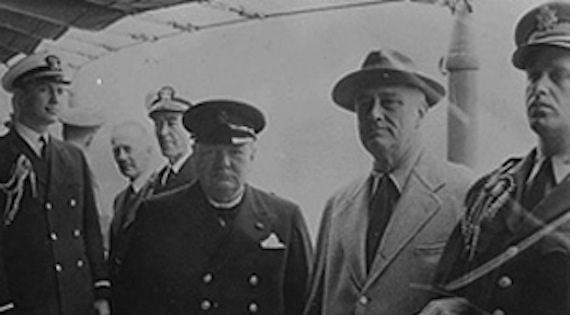
Winston Churchill and Franklin Roosevelt
This Friday, 17th December, is the 70th anniversary of one of the most important speeches ever made by a democratic leader. On this day in 1940 President Franklin Roosevelt announced to the American people his idea of ‘Lend Lease’.
Instead of selling the British what they needed to carry on the fight against the Nazis, Roosevelt said the Americans would ‘lend’ what was required. The folksy analogy Roosevelt used in the speech was that of a good citizen lending a length of hose to his neighbour when his house was on fire. After the fire was put out the hose could be returned, and if it was damaged then the good citizen could later be recompensed with a replacement hose bought by a grateful neighbour.
It was a wholly misleading comparison, of course. Because the British were clearly going to use the equipment the Americans gave them under ‘Lend Lease’ and Roosevelt knew they didn’t have the money to replace it. But nonetheless, Roosevelt’s speech caught the imagination of many Americans – as always FDR knew the right buttons to press. In this case he was locking into the American ‘frontier spirit’ of neighbourliness in adversity.
But for me almost the most significant aspect of this remarkable speech is the timing. Roosevelt had been careful during the Presidential election of 1940 not to give the impression that he was taking America to war. He was standing for an unprecedented third term as President and he knew that any hint of full scale military support for Britain would be dangerous to his chances. So he waited until after his re-election and then carefully announced this opaque ‘Lend Lease’ policy which appealed to the best in the American character.
Roosevelt was to act in a similar way later in the war. During 1944, FDR was careful to conceal the deals he had already done with Stalin from the American people until after he had been re-elected for a fourth term at the end of the year. Indeed, one of the most tragic documents I have ever read is the mournful letter of protest from the Polish Prime Minister who found he had been betrayed by Roosevelt that year. At the Tehran conference at the end of 1943 Roosevelt had agreed with Stalin that the Soviet Union could keep Eastern Poland at the end of the war, but when a Polish delegation visited Washington in the summer of 1944 Roosevelt didn’t tell them that he had already acquiesced in a deal that meant they would lose half of their existing territory. Only in December 1944 did Roosevelt acknowledge the Polish Prime Minister’s reproaches.
It is clear that Roosevelt deliberately misled the American people over this crucial issue. Because Roosevelt, as the record of confidential meetings at the Tehran conference makes clear, said to Stalin that he didn’t want immediately to tell anyone about his acceptance of the Soviet occupation of Eastern Poland because he might lose the sizable ‘Polish vote’ in the 1944 Presidential election. So just as he did in the case of the ‘Lend Lease’ speech, Roosevelt in 1944 kept quiet when the elections were taking place and only once he’d won did the truth begin to emerge.
I once worked, over twenty years ago, for a brilliant television Executive Producer called Richard Drewett. And I remember him telling me that the most important part of any deal was ‘timing’. I didn’t believe him when he first told me, but a study of Roosevelt’s political career makes me think he just might have been absolutely right.
 Twitter
Twitter





